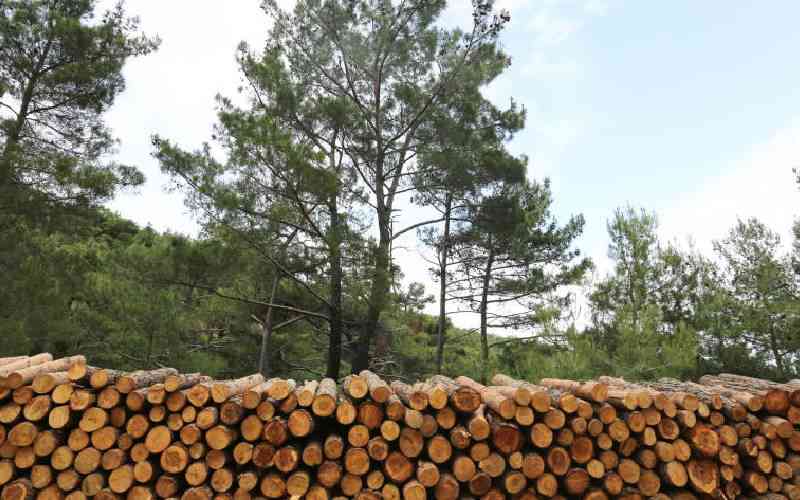
In most peri-urban estates where firewood and charcoal is used for cooking, it is common to come across traders who are selling bundles of short sticks harvested from pine trees.
The sticks are commonly sold to people who light fires or jikos for cooking and are popular because, unlike matchsticks, they keep flames burning once lit.
Dundori Forest Manager Phillip Aitaba explains that the sale of these sticks is informed by the oily properties of pine trees (Pinus Patula).
"The tree has a flammable sap which makes the tree a fire accelerant. Sale of hewn sections of the tree has become common, especially in low-income settlements," says Mr Aitaba, who is an employee of the Kenya Forest Service.
He explains that this trend adds to other risks of this tree being depleted in the forests noting that its premium quality timber makes it a target by illegal loggers and timber merchants.
"We have noted with concern a trend of these trees having their barks hewn. Some people cleave the trees at the bottom to harvest the sap or part of the wood," said Aitaba.
The manager said that this has left some of the damaged trees drying up before maturity and at risk of falling over as they are dangerously left upright within the forest.
Efforts to conserve the trees planted in 2015 by the government in reforestation plan have kicked off in a partnership between KFS and other stakeholders sensitising the communities on the matter.
- Experts call for holistic 'Blue Values' approach to protect Indian Ocean
- Report: Data-driven action key in reducing methane emissions
- How climate change is making people unhealthy
- Kenya leads Africa's voice at global environmental assembly
Keep Reading
"We are working with International Tree Foundation (ITF) and Wezesha Community Based Organisation (WCBO) to tell our people why this illegal trade is a threat to them too," he said.
Aitaba explained that the tree has high affinity for carbon making it an integral part of the ecosystems at a time when the world is grappling with high levels of greenhouse gas emissions.
Through the collaboration, the community is now at the centre of the conservation efforts through the available jobs as they are sensitised on the hard-hitting effects of climate change.
"The community is involved in afforestation, trained on alternative sources of livelihood and identification of indigenous trees that can withstand erratic weather, pests and diseases," he said.
Under the programme, the community has played part in planting over 80,000 indigenous seedlings in the last three months within Dundori Forest which covers a 3,609hectares.
ITF Country Programs Manager Mr Wycliffe Matika underscored the need for increased forest cover by indigenous trees which have more benefits to human and the environment.
"We hope to restore our water catchment areas as we address carbon emissions that have landed us where we are today. Farmers should also plant these trees on their own farms," said Matika.
He noted that through community forest associations involved, older generations should indulge the youth in environmental conservations efforts to safeguard their future.
Redempta Mutisya, the chairperson at WCBO noted that people living in Asal areas were the most vulnerable to effects of climate change hence the need for their active involvement in conservation.
"We have special emphasis on women as stewards of natural resources. They are best placed to contribute in adopting strategies that are environmental friendly in their households," said Mutisya.
She challenged Kenyans to be more proactive in conservation efforts citing that most of Kenya's economic activities are climate sensitive thereby affecting the general population.
"Our agriculture, energy, tourism, wildlife and health are at risk if we don't address weather-related disasters. We are at risk of not only have conflicts but losing livelihoods and lives," she said.
Peter Njoroge, the chairperson of Dundori Forest Community Association says that a majority of the residents have embraced fruit trees planting as an alternative to charcoal burning and firewood harvesting.
"Our membership has continued to grow as more people come on board to help establish tree nurseries. As a community, we want to own the reforestation efforts in destroyed sections of the forest," said Njoroge.
Bernard Kigora, a researcher at Kenya Forest Research Institute (KEFRI) pointed out that the country was still short of the ten percent forest cover recommended under the United Nations (UN).
"We have made great strides in increasing our tree cover but the forest cover needs improvement. We need to jealously guard the trees that we have especially from human destruction," said Kigora.
Kigora said without the required forest cover, the ecosystems remain exposed to high temperatures and prolonged droughts, linked to frequent and intense forest fires.
 The Standard Group Plc is a multi-media organization with investments in media
platforms spanning newspaper print
operations, television, radio broadcasting, digital and online services. The
Standard Group is recognized as a
leading multi-media house in Kenya with a key influence in matters of national
and international interest.
The Standard Group Plc is a multi-media organization with investments in media
platforms spanning newspaper print
operations, television, radio broadcasting, digital and online services. The
Standard Group is recognized as a
leading multi-media house in Kenya with a key influence in matters of national
and international interest.











